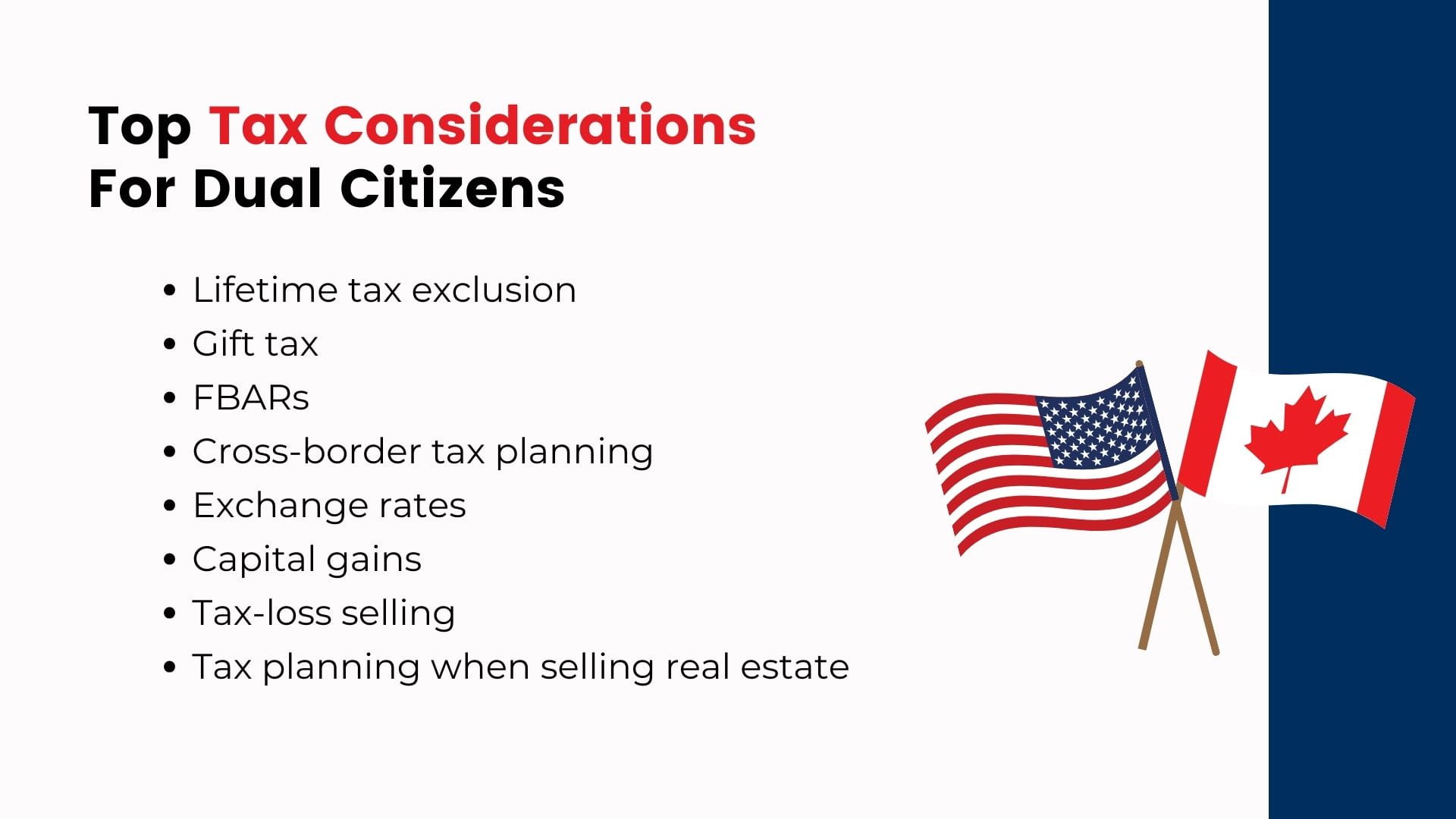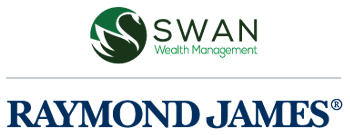Cross Border Financial Planning Resources
The Ultimate Financial Planning Resource For Dual Citizens or Green Card Holders Living in Canada
Written by Tiffany Woodfield, CRPC®, CIM®, TEP®
Reading Time: 10 minutes 30 seconds

When you’re planning a move from the United States to Canada, you want to make sure you have a solid cross-border financial plan.
Whether you currently work with a wealth management team, a CFP, or a financial advisor, switching to a cross-border advisor will allow you to take advantage of their specialized knowledge.
From minimizing your tax burden to ensuring you’re not going to get in trouble with the IRS, cross-border financial planning is the smartest way to handle your financial transition.
For US citizens already living in Canada, cross-border tax planning and working with a financial advisor who has a cross-border specialty will mean you’re no longer worried that you’re doing something wrong.
Your cross-border financial planning should take into account your retirement needs, investment goals, tax considerations, and pensions from Canada and the US. This article will give you a thorough understanding of the cross-border financial landscape. But it’s no substitute for first-person advice. Make sure you book an appointment with both a tax and financial planning specialist at your earliest possible convenience. Doing so will help you identify areas of priority importance.
Table of Contents
- Find an Advisor Who Is Dual Licensed
- Consolidate Your 401(k), 403(b), or 457
- Transferring an IRA into an RRSP
- Working with an Accountant Before Opening an RESP or TFSA
- Contributing to an IRA While Living in Canada
- Using an Alternate US Address (Pitfalls)
- Social Security and CPP
- Canadian Mutual Funds and ETFs are PFICs
- Inherited IRAs and Tax Deferred Growth
- The Secure Act Update
- Estate Planning and US Lifetime Tax Exclusion
- Gift Tax Exclusion
- FBAR Reporting
- Exchange Rates and Your Tax Bill
- Capital Gains and Your Tax Bill
- Tax Loss Selling
- Selling Your Home
- Estate Planning: Non-Resident Executors
- US Trusts and Canadian Residents
- Common Questions
- Next Steps
Cross-Border Financial Planning and Investing for Dual Citizens - Surprising Facts and Tips
Find an advisor who is dual licensed
Working with a dual Canada/US licensed advisor means you don’t have to liquidate your US brokerage accounts or 401(k) and IRAs when you move across the border. Your US advisor isn’t licensed to help you once you live in Canada. Since the (FATCA) Foreign Account Tax Compliance Act came into legislation, the IRS has been increasing their enforcement of rules around foreign investments and bank accounts. Even updating a phone number can trigger a letter from your US advisory firm stating you have 30-60 days to find another advisor or you will be forced to liquidate. It is much better to plan ahead.
You can consolidate your 401k, 403b or 457 by rolling over into an IRA and have it managed from Canada
Often people have multiple 401(k)s or 403(b)s from their careers in the US. If you keep your plan in the US once you move to Canada, those accounts cannot be actively managed and often you cannot even see the holdings. Rolling over your 401(k) to an IRA and having it managed from Canada with a dual licensed financial advisor provides a solution. It helps you to understand your investment strategy and plan income streams for the future.
Transferring an IRA into an RRSP is possible, but it’s not the best solution
Transferring an IRA into an RRSP becomes complicated due to withholding taxes in the US and then having to top up the RRSP with funds from other sources. If an individual cannot top up the RRSP from other sources they will be taxed as income inclusion on the difference between the IRA value and the amount contributed to the RRSP. Also make sure you plan to move to Canada permanently if you do this as you cannot move RRSPs to IRAs.
In addition, IRAs may be considered a superior retirement vehicle as you can stretch out the tax liability longer because you keep the tax deferral status for multiple beneficiaries. In Canada, an RRSP can maintain the tax deferred status only when rolled over to your spouse. For any other beneficiaries, taxes are paid out of the estate, before the beneficiaries receive any inheritance.
Speak to your accountant before you consider opening an RESP or TFSA
As a US person, you have additional filing obligations when investing in RESPs or TFSAs. If you have a non-US person as a spouse, you can put it in their name. However, this only works if the US taxpayer is filing a “Married Filing Separate” US tax return. If they file a “Married Filing Jointly” tax return, the Canadian spouse's income is also reported 100% on the joint US tax return.
Commonly used Canadian mutual funds and ETFs are considered Passive Foreign Investment Companies (PFICs) to the IRS. Investments characterized as PFICs are subject to strict and complicated tax guidelines. This means extra filing for an American or green card holder and potential negative tax implications. Working with a dual licensed investment advisor allows you to avoid these issues.
Contributing to an IRA while living in Canada may not be possible
In general a Canadian taxpayer would not make a contribution to an IRA or 401(k) unless the contribution is deductible for Canadian tax purposes. Contributions to a US employer plan may be deductible if this individual is temporarily working in Canada and participates in a retirement plan offered by their US employer. There are certain conditions that must be met to make a tax deductible claim.
Using an Alternate US Address when living in Canada
If you reside in Canada and provide your US investment firm an alternate address of a friend or relative in order to keep the IRA, it is against SEC guidelines. It is only a matter of time before the IRS will determine where you actually reside. In addition, it can cause state tax issues when you take out RMDs.
Social Security can be decreased when you receive CPP
Because of the Windfall Elimination Provision (WEP), your social security may be reduced if you are receiving the Canada Pension Plan (CPP). Still it’s good to claim for both CPP and WEP as it does not create a negative overall result. Also the WEP applies to your own US social security, but if collecting spousal benefits, WEP doesn’t apply if the spouse isn’t collecting CPP.
Learn more about Social Security.
You are fully insured if you worked 40 quarters (10 years) of employment in the US. You get 4 credits a year. You are currently insured if you earned at least 6 credits during the previous 13 quarter periods. If you are currently living in the US, go to www.ssa.gov/applyonline to apply for a social security online account giving you access to statements, changing your address or applying for benefits.
If you already reside in Canada, you can go to the links below to get information on your social security.
The Social Security retirement age has changed.
Congress passed a law to increase the full retirement age from age 65 up to age 67, depending on the year you were born. To be entitled to full benefits from social security, you need to reach your FRA (full retirement age). Refer to a retirement age calculator to determine your FRA. www.ssa.gov/benefits/retirement/ planner/ageincrease.html

Canadian Mutual Funds and ETFs are considered PFICs
A PFIC is a Passive Foreign Investment Company where the company earns 75% or more of its gross income from non-business operational activities or at least 50% of its assets are used to produce passive income. It is common for a US person to unknowingly hold PFICs. Most Canadian financial advisors don’t realize the negative implications of holding these investments and invest their US clients’ money in them. Common PFICs are Canadian mutual funds, Canadian ETFs, RESPs and TFSAs. Investing in a PFIC causes complicated reporting by your accountant and is taxed punitively.
Inherited IRAs can still benefit from tax-deferred growth
If you are living in Canada and inherit an IRA, you can roll it over to an inherited IRA with a dual licensed financial advisor and continue the tax deferred growth for up to 10 years (or longer if an Eligible Designated Beneficiary, see SECURE Act below).
You should know about the SECURE Act Update
The SECURE Act became law in December of 2019.
The SECURE Act was created to make it easier for Americans to save money for retirement by allowing them to contribute more money to tax-advantaged savings plans and increasing the RMD (Required Minimum Distributions) age. Essentially, this act extended the tax benefits for a longer period.
Prior to the SECURE Act, non-spouse beneficiaries of IRAs could spread the distributions from an inherited IRA over their lifetime. Currently, all funds must be distributed by the end of the 10th year after the account owner's death unless the beneficiary is an EDB (Eligible Designated Beneficiary).
Surviving spouses, disabled persons, chronically ill persons, a beneficiary not more than 10 years younger than the decedent, or the decedent’s minor child are all EDBs. You don't need to take any money out during years 1-9, but the account needs to be emptied by the end of year 10. There are a few exceptions to the new rule.
There was a SECURE ACT 2.0, which passed in 2022 and added more provisions.
Some highlights are the increased age at which individuals must take RMDs, the removal of RMDs for Roth accounts in employers' plans, and an increase in catch-up provisions for older workers.
If you’re a business owner, I recommend reviewing this page from the IRS: SECURE 2.0 Act Info for Businesses from the IRS
A Roth IRA is like a TFSA in Canada, and if you stop contributing, you can retain tax-free growth status.
To keep the tax-free growth status of your Roth IRA, you shouldn’t contribute to the account once you reside in Canada. If you follow these rules, your income and withdrawals are not taxable in Canada. However, if you do contribute, you lose the tax-free status and reporting the income earned and capital gains in Canada is complicated.
You can contribute to an RRSP while living in Canada.
As a US person living and working in Canada, you can earn room in an RRSP. It is recognized by the Canada/US Income Tax Treaty and therefore you get a deduction from your current taxes when you contribute. The growth and earnings within the account aren’t taxable. To confirm your contribution room, look at statements on CRA My Account.
Tax Planning for Dual Citizens | Top Tips

For Estate Planning, you should know about the US Lifetime Tax Exclusion
You can optimize your estate to prevent excessive taxation. Estate tax is a levy on an estate based on the current value of the assets. An estate only pays tax if the value is worth more than the unused US gift and estate exclusion. This exclusion is currently US$11,580,000 per person; spouses together may leave US $23,160,000 to beneficiaries with zero estate tax. But it is scheduled to return to US$5 million adjusted for inflation in 2026. Your estate would get a greater than 40% tax rate for the amount above this exclusion amount. Also, assets in the estate tax base are still entitled to a free step-up in basis (ACB). So beneficiaries inheriting assets may never have to pay capital gains tax on the assets they inherit
Take advantage of Gift Tax Exclusions
Annual gift tax exclusion is US $15,000 per donee with no limit of the number of recipients or US $157,000 to a non-US citizen spouse like a Canadian. You are required by law to report the gift even when you don’t owe money. This amount doesn’t affect the lifetime exemption.
Include your FBAR (Report of Foreign Bank and Financial Accounts) when reporting income
As a US person, you have to report your worldwide income and you need to report any foreign bank accounts if the aggregate total exceeds US$10,000 at any time during the year. Many clients think if they don’t have $10,000 in a particular account they don’t have to report but if all your accounts added together are over $10,000 at any point you have to report all accounts. There are penalties if you fail to comply: if non-willful, it is US $12,921(adjusted to inflation) or if it is willful, 50% of the account value or US $129,210, whichever is greater.
Certain investments are taxed favorably in Canada while others are taxed favorably in the US — make sure your financial advisor knows both sides.
Canada has a higher tax regime than the US. To encourage Canadian residents to invest in Canada, the CRA taxes dividends from Canadian companies favorably. As a US resident, municipal bonds may help to save state tax but the interest is taxable when you reside in Canada.
Exchange Rates are significant and can cause unexpected tax bills
On your US tax return, you have to report gains and losses in US dollars. Just because you have a loss in one currency does not mean that will be the case in another currency. This mismatch could result in an unexpected tax bill. Having an advisor who has the ability to offer investments in CDN or US currency means you aren’t constrained by the foreign exchange.
Capital Gains are taxed differently in Canada and the US
In Canada, capital gains are the difference between purchase price and the sale price. Only half of your capital gain is taxed regardless of how long you owned it. In the US, capital gains are either short term or long term. If the holding period was one year or less, it’s considered short term and is taxed as ordinary income. Conversely if the holding period was greater than a year, the gain is subject to lower tax rates that would more closely resemble the tax-favored capital gains treatment in Canada.
Tax-Loss Selling can allow you to minimize your tax burden — but the rules are different in Canada and the US
The concept with tax-loss selling is that you sell the investments you've lost money on to offset the gains that you’ve realized. You only pay tax on the net amount of gain. In the US and Canada these gains are treated differently. You cannot carry back capital losses in the US but in Canada you can carry back 3 years and carry forward indefinitely. In the US, you can carry forward a tax loss to future years to offset a profit. In addition, in the US, losses that exceed the capital gain can be used to offset ordinary income up to $3000 in any one year.
Selling a home can have tax implications that should be considered in advance
As a US citizen, if you sell your home, whether you are living in Canada or the US, there is an exclusion on the capital gain of up to USD$250,000 if single or USD $500,000 if married and filing jointly. If the capital gain is more than these amounts, tax is owed on the additional gain. To get this exemption you need to have lived in the home two of the past 5 years. Whereas, if living in Canada, as a Canadian citizen, you don’t pay tax on the gain in your principal residence.
Estate Planning for Dual Citizens in Canada
Do not use a non-resident as executor of your will
If you are residing in Canada and have a US resident as the executor of your will, the CRA may determine the estate is resident in the US. This is based on the fact that the decision maker lives in the US. For tax purposes, it is then seen as an offshore trust and double taxation applies through CRA and the IRS. (Speak to a cross-border lawyer before you name the executor of your will.)
US Trusts are not beneficial to Canadian residents
Having a US trust while a resident in Canada isn’t a good idea. From a Canadian tax perspective, the trust is likely considered a Canadian resident trust because the trustees are now Canadian residents. Meaning you will have to file a T3 tax return. It can also cause double taxation.
This information is general in nature and should not be construed or relied upon as legal, tax or accounting advice. We recommend clients seek independent advice from a professional advisor before acting on such information. Please consult with your accountant or lawyer for information on your specific situation.
Common Questions
How does SWAN Wealth Management help its cross-border clients?
Our job is to provide our cross-border clients with the knowledge and tools to manage their money effectively so they can comfortably live the life they want. Our approach includes staying informed on the ever-evolving laws in Canada and the US affecting estate planning, gifting, and investment regulations.
Does SWAN Wealth offer multi-currency investment strategies?
Yes, at SWAN Wealth, we offer Canadian and US currency investment strategies whether you live in Canada or the US. This means you won't be forced to liquidate funds when you move across the border because they are in a different currency.
Can a cross-border financial planner help with tax and estate planning?
Yes, it is essential to have advice for tax and estate planning, and this is even more crucial when you are a cross-border client because you must consider the implications of two countries.
Does a cross-border financial planner typically offer wealth management services?
If you are looking for a one-time financial plan, they won't offer wealth management services, which can limit you because you won't have the complete offerings and guidance needed to stay on track to reach your goals.
Do I need to move my unregistered investment accounts across the border?
Yes, because of regulations, most investment advisors cannot manage accounts for non-residents unless they are dual-licensed. Additionally, an unregistered investment account is a taxable account, which means there are extra complexities that need to be planned for to avoid tax consequences.
Is tax efficiency important when doing cross-border financial planning?
Tax efficiency is crucial when doing cross-border financial planning because you must consider how each country and state will treat income, distributions, gifting, and estate planning.
Which Canadian retirement accounts are good for Americans moving to Canada?
There are different tax consequences for various retirement accounts. In general, it is safe to invest in an RRSP if you have contribution room, but a TFSA and RESP need to be considered carefully as they may have negative tax outcomes.
Will my cross-border lifestyle be negatively affected by Canada's high tax regime?
While Canada has a higher tax regime than the US, there are planning opportunities to help reduce the cost.
Do I need cross-border portfolio management?
All investing involves risk. However, as a dual citizen or US person living in Canada, it's important to be aware of the tax traps a cross-border client can inadvertently fall into.
Next Steps:
Simplify Your Cross-Border Financial Transition
If you would like to speak with a Cross-Border Financial Advisor in order to simplify and optimize your cross-border financial plan, please schedule a call by clicking the link below.
Schedule a Call with Our Cross-Border Team
ABOUT THE AUTHOR
Tiffany Woodfield is a dual-licensed financial advisor and the co-founder of SWAN Wealth Management, along with her husband, John Woodfield. Tiffany specializes in advising clients who live both in Canada and the United States and need to simplify their cross-border financial plan, move their assets across the border, and optimize their investments so they can minimize their tax burden. Together Tiffany and John Woodfield, CFP and Portfolio Manager, help their clients simplify their cross-border finances and create long-term revenue streams that will keep their assets safe whether they live in Canada or the US. Click here to schedule an introductory call with SWANWealth Management.
- SWAN Wealth Management of Raymond James Ltd. Suite 1000 - 1499 St Paul Street Suite 1000 Kelowna, BC V1Y 6P1
- T 250.979.1805
- F 250.979.2749
- Map & Directions
- Map & Directions
© 2025 Raymond James Ltd. All rights reserved.
Privacy | Advisor Website Disclaimers | Manage Cookie Preferences
Raymond James Ltd. is an indirect wholly-owned subsidiary of Raymond James Financial, Inc., regulated by the Canadian Investment Regulatory Organization (CIRO) and is a member of the Canadian Investor Protection Fund.
Securities-related products and services are offered through Raymond James Ltd.
Insurance products and services are offered through Raymond James Financial Planning Ltd, which is not a member of the Canadian Investor Protection Fund.
Raymond James Ltd.’s trust services are offered by Solus Trust Company (“STC”). STC is an affiliate of Raymond James Ltd. and offers trust services across Canada. STC is not regulated by CIRO and is not a Member of the Canadian Investor Protection Fund.
Raymond James advisors are not tax advisors and we recommend that clients seek independent advice from a professional advisor on tax-related matters. Statistics and factual data and other information are from sources RJL believes to be reliable, but their accuracy cannot be guaranteed.
Use of the Raymond James Ltd. website is governed by the Web Use Agreement | Client Concerns.
Raymond James (USA) Ltd., member FINRA/SIPC. Raymond James (USA) Ltd. (RJLU) advisors may only conduct business with residents of the states and/or jurisdictions in which they are properly registered. | RJLU Legal
Please click on the link below to stay connected via email.
*You can withdraw your consent at any time by unsubscribing to our emails.
© 2025 Raymond James Ltd. All rights reserved. Member IIROC / CIPF | Privacy Policy | Web Use Agreement




